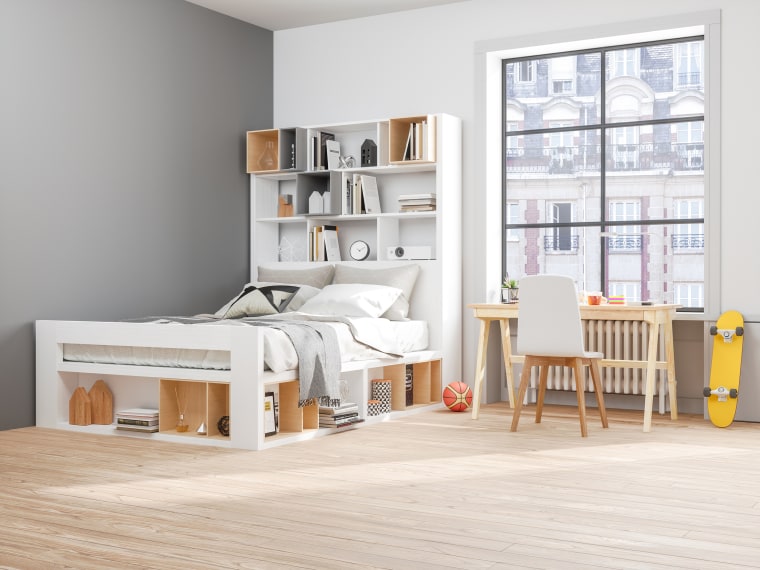As the coronavirus pandemic expands and more cases of the illness are reported, many people are seriously thinking about what their lives might look like if they are asked to quarantine at home. NBC News investigative and consumer correspondent Vicky Nguyen appeared on TODAY to talk about how to make sure your home is prepared for a self-quarantine.
What is a self-quarantine, and who should be doing it?
Doctors or local health officials can ask people to self-quarantine at home for a period of time, typically two weeks, if they may have been exposed to someone who has the virus.
According to NBC News, quarantine means "physically separating a person." It's less severe than isolation, which may be done in a hospital and may last longer. Under quarantine you can still interact with your family and move around your home.
Think about a "home base" if someone were to experience symptoms of COVID-19.
If someone under quarantine begins to feel ill, they would need to isolate themselves from their family. Dr. Eric Cioe-Pena, the Global Director of Health for Northwell Health in New York, said that the first thing people should think about is establishing where a sick person would stay.
"When you walk in the house, the big thing that you want to think about is where you're gonna live in that environment," he said, emphasizing the importance of discussing the process with family, roommates or anyone else who lives in the space.
When choosing the home base area, make sure that it's a room that you can spend the majority of the day in. Be prepared to do daily activities like sleeping and eating, and make sure that anything else you might need, like work materials or sources of entertainment, are in the room.

If you become sick, how can you protect others in the household?
According to Cioe-Pena, if you are in isolation, you can leave the room for necessary reasons, but precautions should be taken to protect other members of the household.
"When you leave the room, you want to take a surgical mask, ideally, and put that on your face," he said. "It will limit your exposure to other people and other surfaces, outside of your room, to particles that when you cough or sneeze and limit your risk of transmitting to other household members."
Despite mask shortages, Cioe-Pena said it should be possible to get surgical masks from a health care provider.
"Usually we'll provide them," he said. "You don't need many. They can be re-used over and over as long as you don't soil them."
Ideally, only one person in the household will be ill, and they will be able to manage their own symptoms. However, that may not be the case. If a patient needs to be cared for, try to designate one caretaker, who should limit contact and wash their hands frequently.
How can you keep the rest of the home clean?
Even with an established home base and preventative measures in place, an infected person will still touch surfaces. Since the virus can live on surfaces for an extended period of time, it's important to keep spaces clean.
"You want to go over all the surfaces, focusing on the areas that the hands are going to touch the most," Cioe-Pena explained.
Fixtures like sinks and toilets should be deeply cleaned, with particular attention being paid to faucets, knobs and toilet handles. Countertops and doorknobs should also be thoroughly cleaned. It's recommended to wear household cleaning gloves to prevent any further spread.
Cioe-Pena said there's not one particular cleaning agent or disinfectant that people should use, but recommended bleach or EPA-approved disinfectants like Lysol. However, he cautioned against using sponges.
"If that's all you've got, you can use it, but that's less than ideal because it stays moist and it holds germs inside it, and so you could actually spread germs with that," he said. "So trying to use disposable things that have the cleaning disinfectant already on them are ideal."
If you are spraying disinfectant, let the product dry on the surface, which will help kill germs.
What happens to your laundry?
Cioe-Pena said that laundry is a "pretty low-risk area."
"You want to make sure that the patient is the person loading the dirty clothes into the washing machine, but washing them with other family members' clothes is fine," Cioe-Pena said. "Just use enough of those pods or the detergents to make sure you get a good soapy mix, and then wash normally."
While doing laundry, Cioe-Pena said there's no need to use different water temperatures. If clothing will tolerate hot water, that's preferred, but there's no need to ruin clothes: Cioe-Pena said soapy, cold water is fine. Clothes should be dried at as high a heat possible.
What if you run out of supplies?
Some store shortages have made it difficult to stock up on the recommended two weeks' worth of supplies. If you run out of necessities while under quarantine, it is possible to re-stock by ordering items through delivery.
"If you want to have the delivery member leave the package or leave the food right outside your door and then collect it, that's the safest," Cioe-Pena said.

